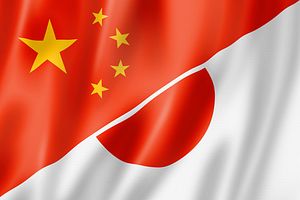After repeated public statement from different Japanese government sources, it appears a meeting between Prime Minister Shinzo Abe and Chinese President Xi Jinping during the upcoming Asia-Pacific Economic Forum (APEC) summit in November may actually take place. The Abe government has made several attempts both publically and privately to arrange such a meeting, as Xi has studiously avoided one-on-one meetings with high-level Japanese officials, notably Abe himself. The most important recent piece of information is that Xi has let it be known he is open to talks, while also likely setting conditions.
Abe took the opportunity to reiterate his interest in meeting Xi during a press conference in Sao Paolo on Saturday as he wound up his recent tour of Latin America. He said the sideline meeting was necessary because there are subjects the leaders need to discuss, and restated his policy toward China of a “mutual beneficial relationship based on common strategic interests,” which he first proposed as prime minister in 2006. Abe also indicated that a previously scheduled visit by Russian President Vladimir Putin had not been ruled out, despite new Japanese sanctions.
On Sunday, the Asahi Shimbun also reported that former Prime Minister Yasuo Fukuda met with Xi during a visit to Beijing on July 27 to 29. Fukuda reportedly used his own contacts to facilitate the meeting in an attempt to smooth relations before the upcoming APEC summit, and again deliver Abe’s request for talks.
According to sources who spoke with the Nikkei Asian Review, Xi said he was willing to mend relations with Japan, and that he was also concerned about the current lack of dialogue between the two countries on important issues. There is also speculation that Xi will have set conditions for any sort of diplomatic breakthrough like an APEC sideline meeting. The two countries have been most at odds over Japan’s nationalization of the disputed Senkaku/Diaoyu Islands in August 2012 and Abe’s visit to the controversial Yasukuni Shrine in December 2013.
Xi and Abe will have much to discuss if they do talk in November. While both have nationalist power bases that they must be mindful of, Abe appears ready to at least attempt putting relations back in order. This may be because he has already scored a few victories that have appeased his base, such as a Cabinet approval of collective self-defense and successful negotiations with North Korea to investigate Japanese citizens abducted in the 1970s and 80s.
For his part, Xi now also appears inclined to meet Abe. Perhaps his successful string of anti-corruption investigations has also given him the confidence and popular support necessary to consider improving ties with Japan, at least for the time being. China has less scope for flexing its emerging military power in the East China Sea than it does in disputes with Southeast Asian countries in the South China Sea. A formidable Japanese/U.S. naval alliance makes a favorable outcome to China in this situation very high cost and high risk. On the other hand, calming hostilities and allowing bilateral trade and investment to recover would be beneficial for China as its economic growth begins to slow. For now, meeting with Abe (or just appearing to consider it), will allow Xi to gauge the domestic response and decide if a further easing of tensions is worthwhile. Meanwhile, with Japan’s economic recovery showing signs of stalling, a meeting between Asia’s two biggest economies must surely seem worthwhile for Abe.

































